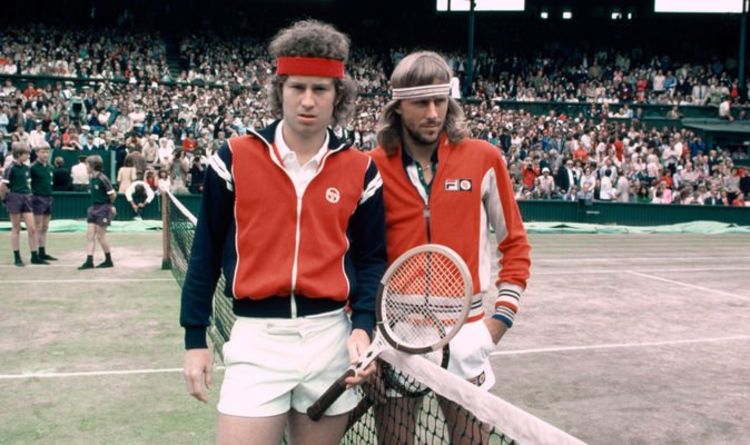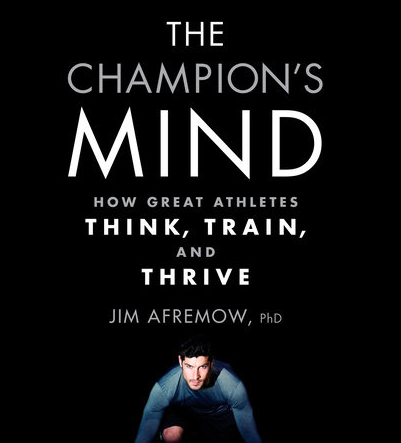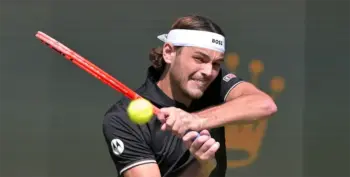Usually, I write a lot of time about fitness and nutrition, that can both help you a ton on the courts. But as we all know, this loved game of ours isn’t just played with physicality but also requires mental strength. There are a ton of books, videos and products available to better your mental performance as a tennis player and there is a reason why.
The most successful athletes in this sport all have on thing in common – they are incredibly strong and resilient in their heads. So here is why you should work on this aspect of your game, too.
It works for the pros
As I mentioned, the top players in the sport are usually known to be very tough mentally. Think of Novak, Rafa or Serena, they all perform their best under pressure. There is not one way that is typical for mental strength, it can be louder or rather reserved and always composed. If we look back to the battles between Borg and McEnroe (see image below), this really showed big time. While Borg was always the same and never let pressure get to him, McEnroe was always high on emotion and engaged with the fight. Both these options have their upsides and downsides, and it comes down to your personality as to which one you prefer or comes naturally to you.
If players with a rather calm attitude don’t perform well under pressure, we assume they are too calm and reserved, like Zverev maybe these days. If an emotional player fails, the other way around we assume he or she is not focused enough, like with early McEnroe or Rublev these days. Equally, you will applaud those players if it goes well and there are a ton of examples for all those personalities.
Calm players like Borg, Federer, Swiatek or Barty can be as successful as hot heads such as McEnroe or Sabalenka. But the most successful players, such as Djokovic, Nadal or Serena Williams, have found a way to combine both emotion and calmness to winning mental formula.

What are the most important qualities?
Based on this, a mix of certain skills seems to be the most successful way. On the one hand, you want to be as calm and collected as possible, so that you can play every situation the same. Look at Jannik Sinner, who hardly ever plays an unmotivated or unconcentrated rally, even in five set matches.
On the contrary, players like him or Djokovic seem to have another gear of focus once it gets to the deciding point in tight matches. On the other hand, this doesn’t mean that you need to be absolutely still and indifferent on court. You also need to be able to take emotion to re-group and find your best again. Look at Nadal and his celebrations when having to fight back or finding special shots in crucial moments. These are not spontaneous outbursts, but mostly very well selected moments to get into the right mindset to win.
So, we have focus and emotion in a mix, but what are we missing then? Mainly the number one Rafael Nadal quality, never giving up. Whether he is up 6-0 or down a set and a break, the Spaniard will always throw everything at you. This quality definitely also is a large part of the mental game, along with other things, such as executing a strategy and adapting during the match. Pros have sports psychologists, coaches and a multitude of elements that they are working with. But how can you as a club or hobby player work on this aspect?
How to improve your mental game
Of course, not everyone of us weekend warriors has the budget and time to work with a dedicated coach. But there are plenty of resources and hacks you can use to improve your mental fortitude on a tennis court. Number one in my eyes is to improve your overall stress management and expectations. If you are struggling with stress, problems or even mental health, chances are that you will do a Rublev impression on court.
Make sure to not carry your problems into your matches and really work on those. Also, what I have done a ton of times, don’t go in with wrong expectations and unprepared for problems. Tennis matches are hardly ever easy and usually you get some curveballs thrown at you, so be prepared for the unknown in your mind, whilst also having a plan.
Book tips
Books are great resources for this, and there are a couple of great ones on mental game for tennis. The most known might be “The Inner Game of Tennis” by Timothy Gallwey (get it on Amazon here). His approach might seem a bit complicated at times, but this can surely be regarded as the standard go to book for mental improvement in tennis. Another recommendation, albeit not focused on tennis, is “The Champion’s Mind” by Jim Afremow, which has a lot of insights into mental strength of top athletes. And finally, Brad Gilbert’s “Winning Ugly” might be a bit more hands-on, but also has a lot of insights for your own mental game aside from strategies to distract your opponent.

After all, we mostly want to enjoy tennis and play this beautiful sport and at times we then think that mental strategies are for hyper-competitive people only. But trust me, tennis is much more fun when you are thriving and winning out there, so try to get some mental tips and let us know how you feel about those in the comments!















